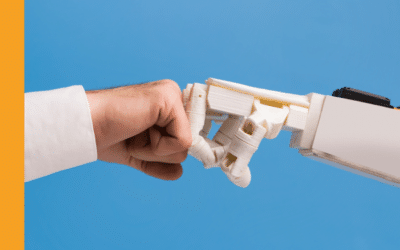On account of the fact that classroom-based teaching no longer provides sufficient stimulation for employees at corporate training, different ways of learning have been given greater priority in recent years, such as on-the-job and gaining knowledge through peers.
The importance of both is emphasised by the 70:20:10 Model for Learning and Development, which is typically credited to Morgan McCall and his colleagues Michael Lombardo and Robert Eichinger working at the Centre of Creative Leadership (CCL).
After asking nearly 200 executives to self-report on how they believed they learned, McCall summarised that:
“Lessons learned by successful and effective managers are roughly:
- 70 per cent from tough jobs
- 20 per cent from people (mostly the boss)
- 10 per cent from courses and reading”
Lombardo and Eichinger also expressed their rationale behind the 70:20:10 model in the book The Career Architect Development Planner:
“Development generally begins with a realisation of current or future need and the motivation to do something about it. This might come from feedback, a mistake, watching other people’s reactions, failing or not being up to a task – in other words, from experience. The odds are that development will be about 70 per cent from on-the-job experiences – working on tasks and problems; about 20 per cent from feedback and working around good and bad examples of the need; and 10 per cent from courses and reading.”
To this end, more and more businesses are trying to figure out how they can support this type of learning model. But at the same time, this might be a bit of a pointless exercise, as Generation Y (millenials) are changing the way we learn in a different way.
Not only do millenials now outnumber other generations in the workplace, they are also extremely good at learning and personal development. This is not necessarily down to the 70:20:10 model either, as technology, understanding, and attitude are proving to be more important factors in their overall development.
The use of technology
Seeing as millenials have grown up alongside technology, it is perhaps no surprise to hear that they are using the digital tools at their disposal for skills and knowledge acquisition. All it takes is a quick search on Google or social networks like Twitter and Facebook to discover more information about a particular subject. What’s more, this can all be done through the instantaneous convenience of a mobile device.
But in addition to watching how-to videos on YouTube, reading books on their tablets and listening to audiobooks on their smartphones, this generation is also more than willing to pay for learning resources too. In fact, nearly 25 per cent of millenials spend more than $300 per year on personal development resources.
Consequently, employers must adopt a different stance towards training instead of reviewing the 70:20:10 model for answers. A better approach would be to help members of staff in their digital quest for knowledge. The employer can then be sure that any online activity is supporting their career, learning and personal development.
Another option is to enlist the services of an e-Learning training provider that already has digital capabilities in place, such as gamification or spaced repetition solutions, which can easily be modified and adjusted according to the employer’s requirements.
Understanding the importance of soft skills
Another reason why the 70:20:10 model does not always apply to millenials is that they have and are still acquiring knowledge from other sources away from the workplace. For example, millenials have been educated by their parents much more than previous generations. This doesn’t refer to academic subjects or home schooling, but rather transferable soft skills such as emotional intelligence.
At school, millenials were also taught that securing a place at university or finding full-time employment didn’t solely depend on academic prowess. It was equally important to be a well-rounded individual who knew the value of working in a team and helping others that needed assistance. Therefore, charity work and team sports were regarded as significant as classroom subjects.
Upon entering employment, millenials are equipped with a great deal of knowledge but also a wide range of soft skills as well. While this has extensive advantages in terms of carrying out day-to-day responsibilities, it can also bring about numerous benefits as far as training goes too.
Millenials will need little convincing that different or alternative training methods are important and are bound to enjoy a different approach to classroom-based teaching. However, they will still require support on identifying areas that need improving and constant feedback on their performance.
Learning away from the workplace
Again, it is necessary to look back at the education of millenials for this particular point. At school, this generation were encouraged to attend afterschool clubs or develop an interest in subjects that required the acquisition of different skills.
From playing football and performing in shows to learning a different language or new musical instrument, a lot of personal time would be invested in clubs and communities. But regardless of where or when these activities took place, the lines between “learning” and “having fun” became blurred, something which has carried on into the working lives of several millenials.
So today, millenials are not only happy to increase their learning or skills acquisition away from the workplace, they almost expect it. They also want to have an active interest in training and contribute to this activity, rather than simply being a passive member of the classroom.
However, this doesn’t mean to say you can simply force training onto your members of staff when they aren’t at work, as millenials recognise the importance of personal time too. For this reason, you must be flexible with your approach to training and provide numerous opportunities for when, where, and how it can happen.
How Generation Y are changing the way we learn
While some sections of the workforce will still exhibit the learning behaviours described in the 70:20:10 model, millenials are increasingly abandoning this mind-set due to their previous experiences.
Therefore, employers must recognise that the use of technology, the importance of soft skills, and learning away from the workplace must be critical considerations when devising a modern-day training strategy for Generation Y employees.





